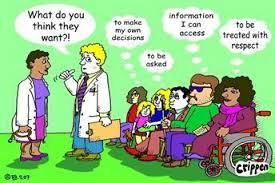
I am a sucker for Indian reality shows and never miss a single day’s drama that unfolds on the screen. One such show that I regularly watch is “ Nach Baliye”( Dancing with your partner). This show has Indian celebrities with their spouses and partners all dancing for the coveted prize money and the ugly looking trophy!.
Before you start giving me puzzled looks about my love for the show and the title of my article, let me introduce to you one of the contestants on the show, Vinod Thakur ( 24yrs) and his wife Raksha (23 yrs.). So, what’s the big deal with them you may ask, they are participants & married to each other (partnership being the pre- requisite of the show) like all others in the show, isn’t it? Wait a bit, till I tell you what’s special. Vinod was born without any legs and yet his love for dancing has seen him perform in shows around India and has made him reach the final five in the show that I am a sucker of. ( http://www.youtube.com/watch?v=aGWF__ueGlE and http://www.youtube.com/watch?v=rQuoE5N_E6o)
When I first saw Vinod dancing, I was awestruck and dumbfounded. He was superb. Since Vinod and Raksha are the youngest couple on the show, it is extremely heart-warming to see the way they react to each other rather than the audience, when they get a standing ovation from the judges. The hugs and the smiles that pass between them make me want to run and hug them. However, this feeling is marred by the whispers around me of people who keep wondering about how Raksha is “managing” with Vinod as his non- disabled partner. Some people have gone to an extent of suggesting how incredibly great it is of Raksha to marry Vinod.
The attitude reflects the general perception of society towards those with a disability. Persons with disability are to be pitied but not to be loved by another person as partners and spouses. When we do come across such couples as Vinod and Raksha, we either elevate the non- disabled partner to a pedestal or in modern times, mourn about the lack of sex and sexual intimacy in such situations. What makes me angry is that in either situation, we sympathize with the non- physically disabled partner, totally forgetting essentially partnership consists of two people.
Why do we forget the Person with disability ? For me the answer is quite simple. Society does not think of the differently- abled first and foremost as sexual beings. They are considered objects of care and pity. Charity, medical or rehabilitation models all view disability as damaged, flawed and something that needs to be “corrected” . And by this logic who would want “ damaged goods” as a partner. Disabled are not “ complete”; the one who is not complete does not get complete rights. People with disabilities are often assumed to be either ‘asexual’ or ‘oversexed’. Society largely considers them unattractive and therefore incapable of being in sexual or intimate relationships treating them as lesser human beings.
Since sympathy and pity are two main ingredients that are used in the interaction with the differently abled, an attitudinal barrier is created where those with a disability are assumed to be child-like and therefore by that logic deprived of the the rights of self determination. Infantilizing the differently abled population often forgetting the fact that the same hormones, emotions run through them as they run through a non- disabled person.
Parents and care providers are faced with the challenge of addressing sexuality related concerns of their young children with disabilities which often brings home the sentiment of “We ignore the reality of children as eventually being sexual and reproductive beings”. In a culture that perpetuates greatly and encourages the “ culture of silence” around all matters related to sex & sexuality, would it be expecting too much that the emotions, feelings and needs of a disabled person are taken into account? When the person starts exhibiting comprehension of his/ own sexuality, either privately or in public, the issue is looked at from the perspective of a “ problem solving approach rather than addressing it. People with disabilities are often chastised by their care-givers for expressing their sexuality and are often ridiculed as well. Instead of addressing it, what do we do? We chastise them & fill their being with guilt & shame.
The struggle of a differently abled person to experience and express sexuality is portrayed very finely in the academy award winning film Sessions based on the article “On Seeing a Sex Surrogate". The movie depicts the life of Mark O'Brien , a poet paralysed from the neck down who hires a sex surrogate to lose his virginity and share feelings of intimacy.
Like any other couple, Vinod and Raksha are very much in love with one another. For them Vinod’s disability is incidental. The least the non- disabled population can do is let them enjoy the love and intimacy that they have for each other without raising unnecessary questions about “how do they do it” or putting the non- disabled partner on a pedestal. Sexuality is a form of communication, of expressing one's own personality to another person, regardless of one’s physical and mental abilities or disabilities.
How ironic it is that we often use the phrase “love is blind” and then go on and deny the right to love and its varied expressions to all.










Add new comment